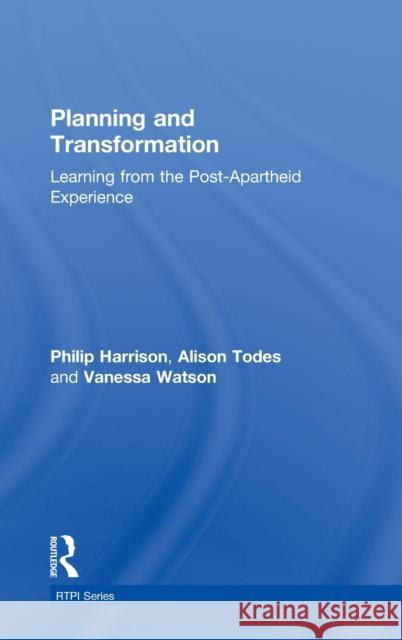Planning and Transformation: Learning from the Post-Apartheid Experience » książka
Planning and Transformation: Learning from the Post-Apartheid Experience
ISBN-13: 9780415360333 / Angielski / Twarda / 2007 / 320 str.
Planning and Transformation: Learning from the Post-Apartheid Experience
ISBN-13: 9780415360333 / Angielski / Twarda / 2007 / 320 str.
(netto: 927,20 VAT: 5%)
Najniższa cena z 30 dni: 881,54
ok. 16-18 dni roboczych.
Darmowa dostawa!
In the years after the 1994 transition to democracy in South Africa, planners were convinced that they would be able to successfully promote a vision of integrated, equitable and sustainable cities, and counter the spatial distortions created by apartheid. This book explores the experience of planning in South Africa during the ten years from 1994, with the aim of contributing to key international debates in planning theory. The authors argue that, because of the highly fluid nature of South African society during these last ten years, this country provides a useful 'laboratory' in which to explore the possibilities of achievement in the planning field. Thus while many of the factors which have affected planning have been context-specific, the nature of South Africa's transition and its relationship to global dynamics have meant that many of the issues which confront planners in other parts of the world are echoed here as well. Issues of governance, integration, market competitiveness, sustainability, democracy and values are as significant here as they are elsewhere, and the particular nature of the South African experience lends new insights to thinking on these questions.
The book is subdivided into sections which reflect the main themes in international planning debates. After Part A, which sets the scene in terms of the overall objectives of the book and the changing nature of planning under apartheid and in the post-apartheid era, the sections deal with:
Planning and governance, including planning at the local, regional, national and transnational scales;
Discourses of planning, including those of spatial frameworks, integration and transformation, planning'srelationship to the market, and discourses related to environment and sustainability;
Planning and society, including professionalism, education, planning values, its response to diversity and informality, and to the big social issues of AIDS, poverty and crime
A concluding section considers the power of planning in the South African context and the limits to its power.











